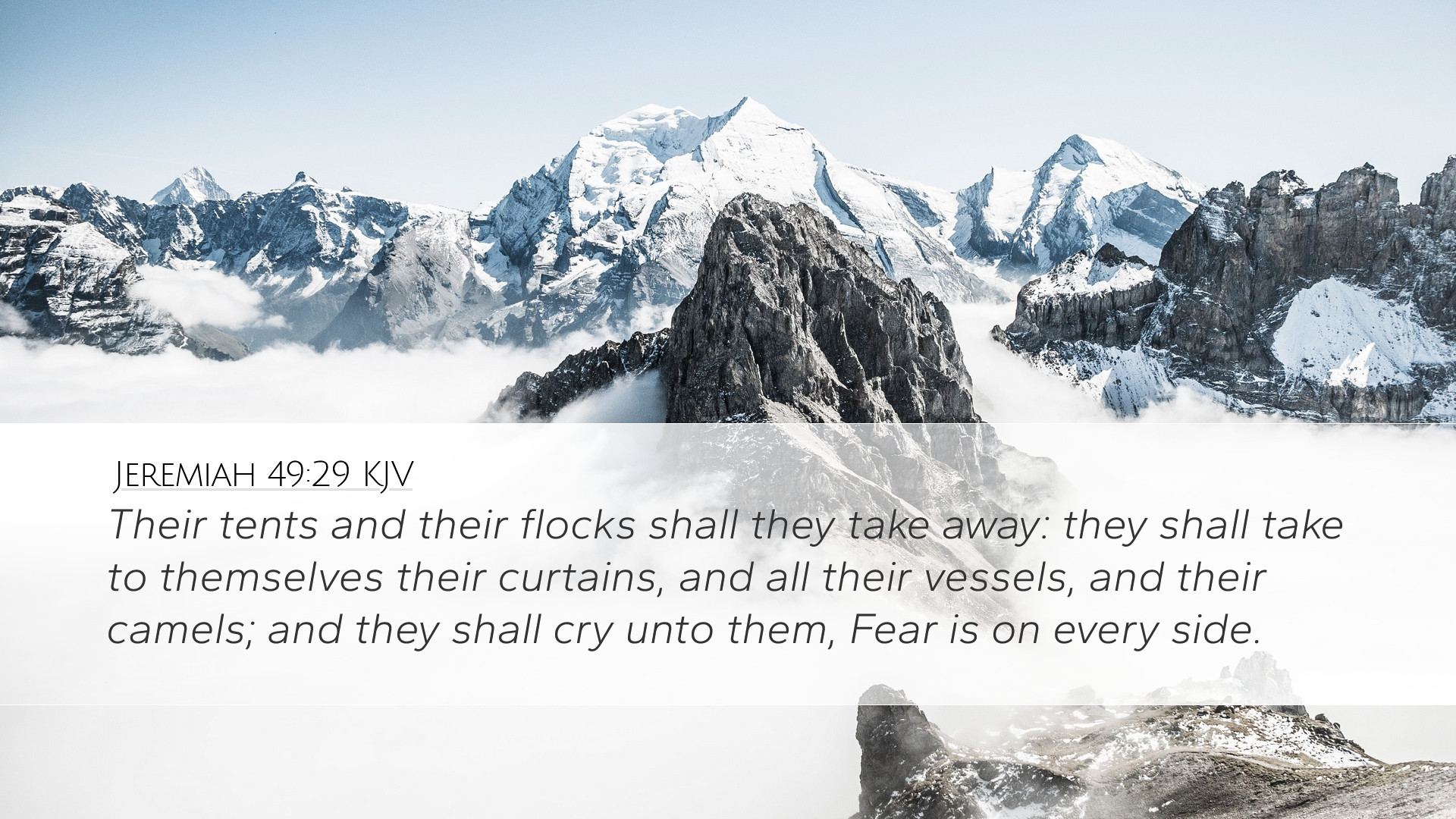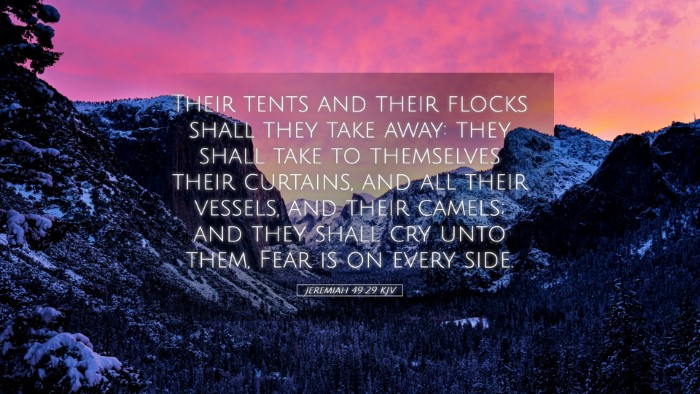Commentary on Jeremiah 49:29
Verse Text: “Their tents and their flocks shall they take away: they shall take to themselves their curtains, and all their vessels, and their camels; and they shall cry unto them, Fear is on every side.” (Jeremiah 49:29, KJV)
Introduction
This verse forms part of a prophecy concerning the judgment of the nation of Kedar, a tribe of Ishmaelites. In this prophetic declaration, the prophet Jeremiah portrays a vivid picture of the desolation that will befall them due to their iniquities. The imagery introduced in this verse is reminiscent of the historical conquests seen throughout Israel's history where invaders would plunder and instill terror amongst the populace. This commentary will explore various insights drawn from public domain sources, including the works of Matthew Henry, Albert Barnes, and Adam Clarke.
Contextual Background
The prophecy against Kedar and the other nations surrounding Israel pivots on recurring themes of judgment and restoration found throughout the book of Jeremiah. It is essential to understand that Kedar, as a nomadic people, depended heavily on their livestock and portable dwellings for sustenance. Thus, to speak of their tents and flocks being taken away directly applies to their way of life.
Exegesis of Key Phrases
Tents and Flocks:
Henry emphasizes that the mention of tents signifies the nomadic lifestyle of the Kedarites. Their tents represent not just their physical dwelling but also their identity and livelihood. Barnes notes that their flocks indicate the wealth and resources that they accrued, which would be taken from them in the impending judgment.
Take to Themselves:
Clarke elaborates on the phrase "take to themselves," indicating that this decision to seize resources is coupled with an unwarranted sense of security that the enemies of Kedar would possess. This act encapsulates the suddenness and inevitability of the divine judgment as they would find themselves stripped of both possessions and comfort.
Fear is on Every Side:
The declaration that “fear is on every side” evokes the chaos that ensues when divine judgment is realized. This dread stems not only from the loss of possessions but also from the moral and spiritual vacuity that led to such a fate. Matthew Henry poignantly reflects on how the fear that surrounds the people encapsulates their impending doom, where the terror is not just physical but spiritual.
Theological Implications
This verse compels readers to ponder the consequences of turning from God. The impending doom foretold for Kedar serves as a reminder to all nations and individuals about the dangers of neglecting godly principles. Several key theological implications arise:
- Divine Judgment: The prophetic language highlights God's sovereignty and justice. As seen throughout Scripture, rebellion against divine authority leads to inevitable consequences.
- Transience of Material Wealth: The stripping away of flocks and tents emphasizes the fleeting nature of material possessions—and how reliance upon them can lead to ruin.
- Call to Repentance: Implicit in the warning against Kedar is a broader call for repentance from all nations. God’s judgments should lead humanity to turn back to Him.
Practical Applications
For pastors, students of theology, and scholars, this verse underscores several applications for modern readers:
- Awareness of Spiritual Dangers: Believers ought to maintain vigilance against complacency and spiritual negligence in their walk with God.
- Value of Community: Just as Kedar's nomadic existence depended upon their flocks, Christian communities should center their lives around fellowship, mutual support, and reliance on God.
- Proclamation of God's Word: This verse is a call to engage in prophetic ministry, reminding communities of the urgent need for repentance and the need to turn hearts back to God.
Conclusion
Jeremiah 49:29 serves as a powerful reminder of the consequences of abandonment of divine principles. The insights drawn from respected commentators elucidate not only the immediate implications for the people of Kedar but also broader themes that resonate throughout the biblical narrative. As we reflect upon the warning contained in this verse, may we be spurred towards faithfulness, repentance, and a deeper understanding of God's justice and mercy.


